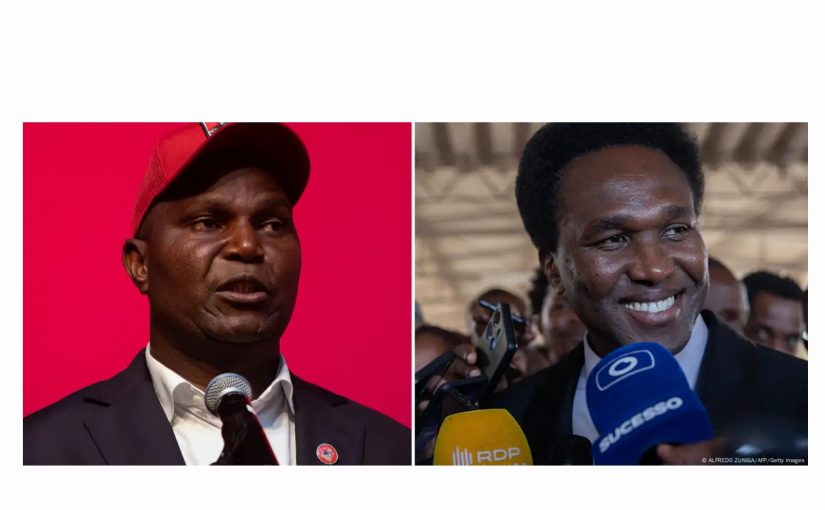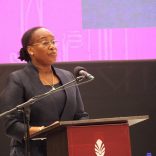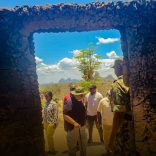Mozambique: “Failures and persistent challenges” must not be marginalized
Mozambique Elections: Frelimo vs Venâncio Mondlane, a dialogue of the deaf?

Image: DW
- Suspicions that Frelimo’s offer of dialogue to Mondlane is not genuine and is merely a strategy to buy time.
- The forecast includes extreme outcomes: Frelimo admitting defeat or Mondlane’s death.
When the popular uprising took hold of Mozambique on 21 October, Frelimo readily showed itself open to dialogue with Venâncio Mondlane, warning, however, that there are “red lines in this dialogue”.
Podemos, the party that supports the current independent presidential candidate, however, seems to view the goodwill of the governing party with suspicion. Spokesperson Pires Eugénio states: “We have seen our government very committed to the Angolan government and that the Angolan government is an expert in this matter”.
“And it is said that this tactic was adopted by the Angolan government, which is what it did in the last elections,” he highlights.
Mozambican academic Rufino Sitói also has reservations about the genuineness of the offer from the party that has governed for almost 50 years. In a high-level dialogue, what aspects relevant to Mozambique and its people would be discussed between the opposing parties?
For Sitói, it would be “first, the return of the decision-making power over electoral matters to the district courts, which was a reversal that followed the local elections”.
“I also think that we need to look at the de-partisanization of the CNE; it makes no sense for the CNE to be the result of the partisanization of political parties,” the academic continues.
Another essential element for the researcher would be “taking away from the CNE the power to decide by means of voting, for example, issues of electoral results”.
Is the GNU a risk?
Regarding the much-speculated Government of National Unity (GNU), Sitói admits that it is a possibility, but with a caveat: “It seems difficult to me, because from a legal and constitutional point of view the president still has a lot of control over the state. It seems to me that neither Frelimo nor Venâncio Mondlane are willing to give up the presidency.”
READ: Mozambique Elections: ‘Unprecedented alliance’ to contest election results – opposition
CIP Mozambique Elections: Catholic bishops suggest possibility of a government of national unity
Portuguese academic Fernando Cardoso believes that Venâncio Mondlane’s demand for the release of the notices(editais) that were allegedly at the origin of the electoral fraud, which triggered the popular tension, could be brought to the table in negotiations.
However, Cardoso believes that the willingness to talk is nothing more than a strategy by Frelimo to gain time in a crisis, although he appreciates the predisposition to do so. But the academic does not believe in a successful outcome: “I think it is a dialogue of the deaf. Honestly, I am extremely negative about what is going to happen, I believe that this will not go well and I believe that Frelimo will have to accept that it lost the elections and will have to hand over power – that is the only solution I see.”
Venâncio Mondlane’s assassination?
But he envisages a more extreme hypothesis: “The other solution is to kill Venâncio Mondlane”.
But what would be ideal for the country and what the opposing parties want may not converge completely. Even before the popular uprising, a Government of National Unity was being suggested as a possible solution to the crisis.
Sitói sees Frelimo in a state of deep denial and insists that the “liberators” are not likely not give up the presidency of the country in the expected dialogue:
“Frelimo would demand the Presidency of the Republic; this is the biggest reason for contention between the two groups”. “Frelimo would perhaps offer Venâncio Mondlane more seats in parliament, but the Assembly of the Republic does nothing in Mozambique”.
And regarding a GNU, Sitoe believes that “perhaps ministerial issues, with ministries that have more powers. Usually there are disputes over the Ministry of Defence, Finance and State Intelligence. But I don’t know if Frelimo is willing to do that and if it has already realized that it is facing a serious problem”.
Stalemate in sight
The same would be required of Venâncio Mondlane, says Sitoe:
“It seems to me that he is worried about assuming power, and this is the reason why people are taking to the streets to contest [his supposed defeat],” he claims. A stalemate would emerge.
Sitoe stresses, however, that this would only be a dialogue being prepared and not a negotiation. But the academic advocates holding new elections with the necessary reforms to the electoral system, a process that is expected to be long and devoid of final consensus.
Fernando Cardoso agrees and predicts: “The most that Frelimo is willing to do is a kind of National Unity Government, including Podemos, MDM and Renamo in a government presided over by Daniel Chapo [of Frelimo].”
However, he warns that “if Venâncio Mondlane accepts this solution, it means that he will lose face in the eyes of those who voted for him. I think it is very difficult to find any solution that does not go against Frelimo’s entrenched interests, and I think Venâncio Mondlane will not accept that”.












Leave a Reply
Be the First to Comment!
You must be logged in to post a comment.
You must be logged in to post a comment.